Key takeaways:
- Marriage licenses are essential legal documents that also serve as genealogical records, linking families across generations.
- Genealogical research benefits from various tools, including online databases, local archives, and community interactions that enhance the search for family history.
- Documenting findings is crucial; combining insights with emotions creates a richer understanding of one’s heritage and family narrative.
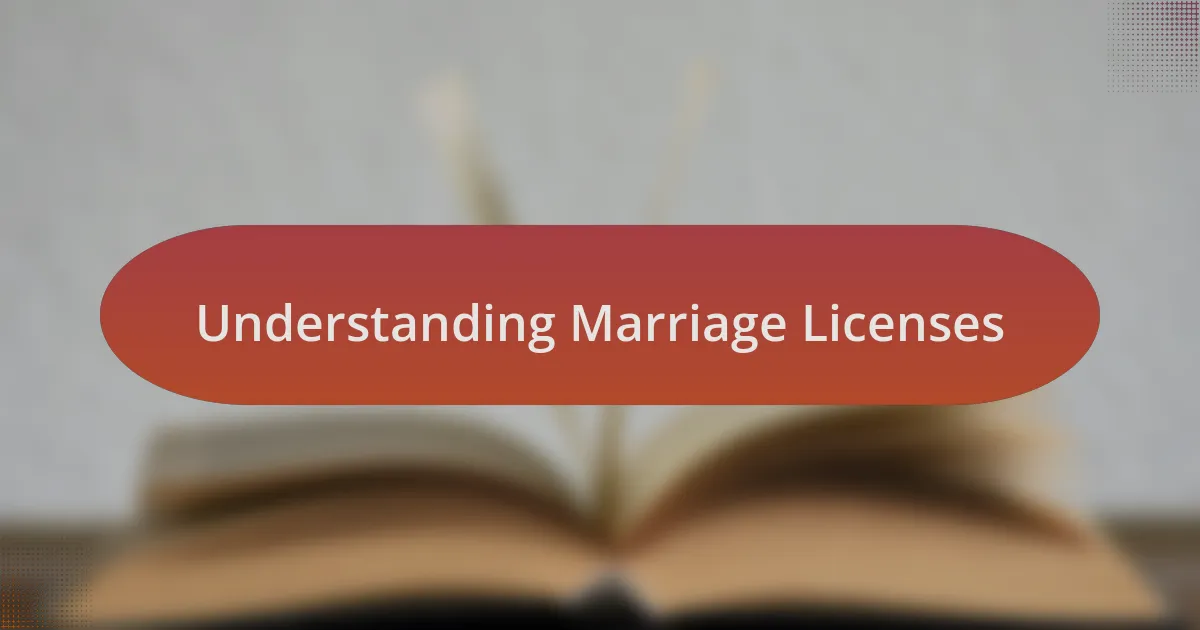
Understanding Marriage Licenses
Marriage licenses are official documents issued by a governing authority, allowing two individuals to wed legally. When I first encountered my grandparents’ marriage license during my research, I felt a wave of nostalgia; it was like uncovering a hidden piece of their love story. Have you ever wondered what stories lie behind the simple signatures and dates on such documents?
Understanding marriage licenses also involves recognizing the requirements that vary by state. For instance, some places require blood tests or residency while others focus mainly on the couple’s age and identification. I remember the thrill of diving into the specific regulations of each state, thinking how different their journey would have been if they lived elsewhere.
Additionally, marriage licenses serve as vital genealogical records. They often list not only the names of the couple but also their parents, which can open doors to further family research. When I found my grandparents’ names listed alongside their parents, it stirred a deep connection within me, linking generations past to my present. Isn’t it fascinating how a single piece of paper can weave together so many lives?
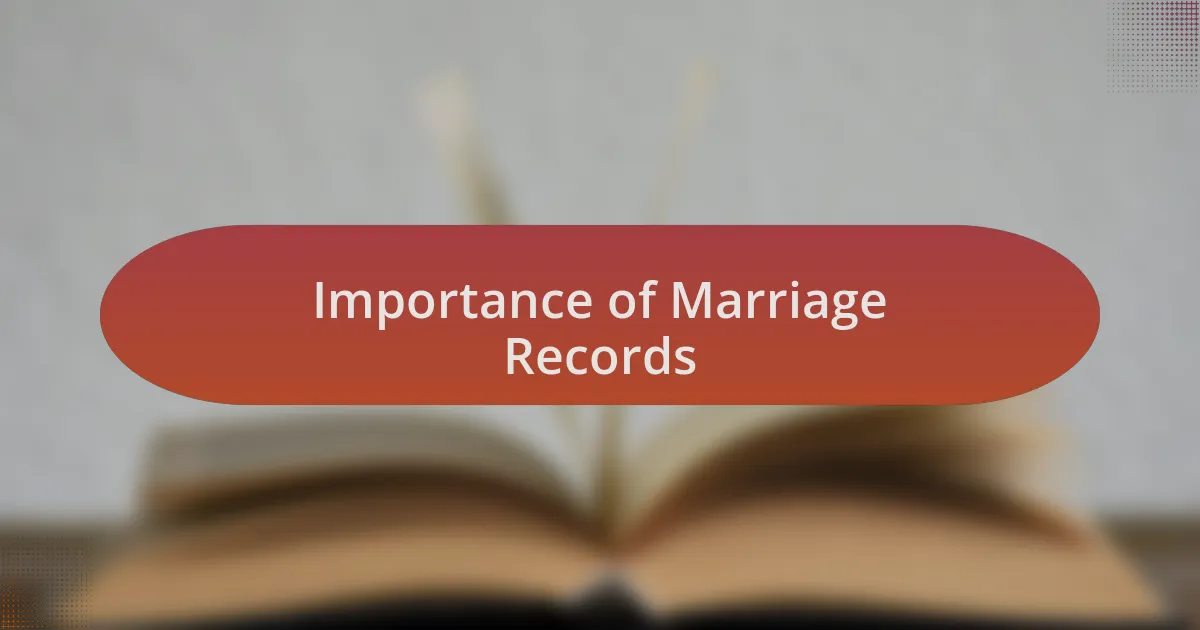
Importance of Marriage Records
Marriage records are more than just legal documents; they hold the keys to family history. I remember the moment I grasped their significance while sifting through old papers. Seeing my grandparents’ names next to their wedding date was like unlocking a door to their past, filled with dreams and hopes. Have you ever considered how much these records can reveal about love stories that shaped our families?
These records serve as foundational stones in genealogy research. They can trace lineage and identify connections that might otherwise stay hidden. When I discovered my great-grandparents’ names through my grandparents’ marriage license, it felt like building a bridge to my heritage, allowing me to see the traits and patterns that run through my family. Isn’t it profound how each name carries a legacy?
Moreover, marriage records provide context about cultural and societal norms during different eras. Reflecting on my grandparents’ time, I found it intriguing to think about the expectations and traditions they navigated. It added depth to my understanding of their lives and challenges. How can a simple document encapsulate so much history, yet it does? It truly makes you appreciate the rich tapestry of life that marriage records represent.

Tools for Genealogical Research
Finding the right tools for genealogical research can make all the difference in your journey. I often turn to online databases like Ancestry.com or FamilySearch, which provide access to a treasure trove of records. When I stumbled upon a digital archive that included my grandparents’ marriage license, it was like discovering a hidden gem in a vast ocean of information.
I’ve also found that local libraries and historical societies can be goldmines for genealogical tools. These places often house unique records and staff who are enthusiastic and knowledgeable about the community’s history. During one visit, a librarian introduced me to microfilm archives, leading me to articles about family events that I had never known existed. Isn’t it amazing how a conversation with a stranger can steer your research in a completely new direction?
Don’t overlook the power of social media and genealogy forums too. Engaging with others who share your interests can lead to unexpected insights and connections. I remember posting a simple inquiry about my last name and was surprised when someone reached out with shared ancestry links. Have you considered how community can enhance your search for family history? There’s so much to gain when you collaborate with fellow genealogists!
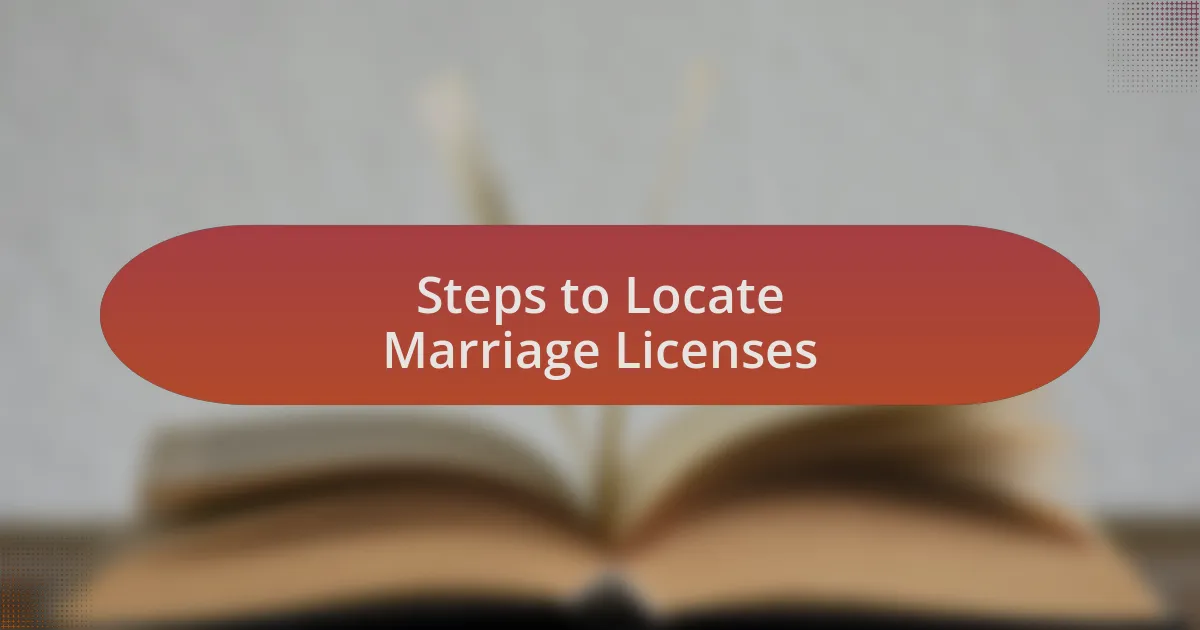
Steps to Locate Marriage Licenses
To start the search for a marriage license, I recommend visiting the official government website of the county where the marriage took place. I recall reaching out to my great-grandparents’ county office, and the staff there were incredibly helpful. They guided me through the process and made it easy to request a copy—definitely worth the effort!
Another step is to gather as much information as possible about the couple, including their full names, the marriage date, and ideally, the location. I remember feeling a sense of accomplishment when I mapped out their timeline; it converted a vague search into a focused mission. The more details you have, the smoother your journey will be.
Don’t forget about the option of requesting records through mail or online forms if you can’t visit in person. I once mailed a form with a few details and a small fee, and weeks later, I was overjoyed to find my grandparent’s marriage license tucked inside my mailbox. Have you considered how such a simple process can hold so much significance for your family story? The excitement is palpable when you realize you’re just a few steps away from uncovering your ancestry.
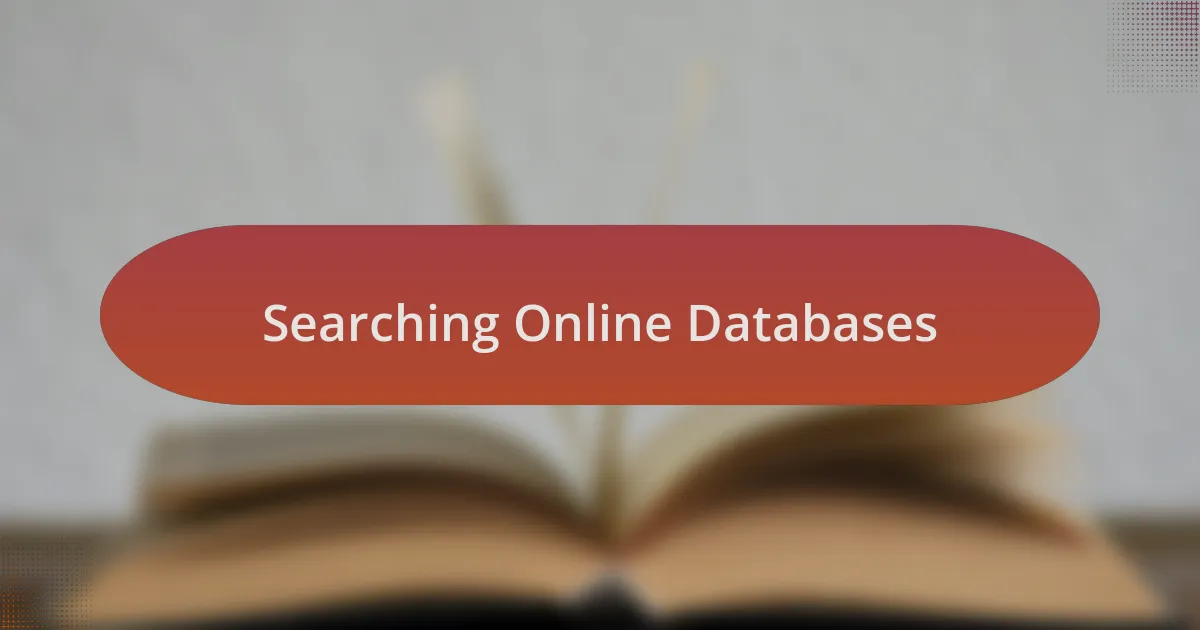
Searching Online Databases
When I started my quest for my grandparents’ marriage license, I turned to online databases first. I was surprisingly amazed by the wealth of information at my fingertips—specific websites dedicated to genealogy often pull data from multiple sources. It’s fascinating how a simple search can yield records you never knew existed, like newspaper articles that include announcements of their marriage.
Utilizing tools like Ancestry or FamilySearch can significantly streamline your research process. I remember entering my grandparents’ names into the search bar, holding my breath as I clicked “search.” The thrill of finding an exact match, complete with the marriage details I had been chasing, felt like discovering hidden treasure. Have you experienced the rush of finding that one record that changes everything?
Don’t overlook the importance of community-driven resources, such as local archives or historical societies. I stumbled upon a small online forum where a fellow genealogy enthusiast shared tips about accessing digitized records. The sense of camaraderie and shared purpose in those groups made my search feel even more rewarding, akin to being part of a grand ancestral quest.
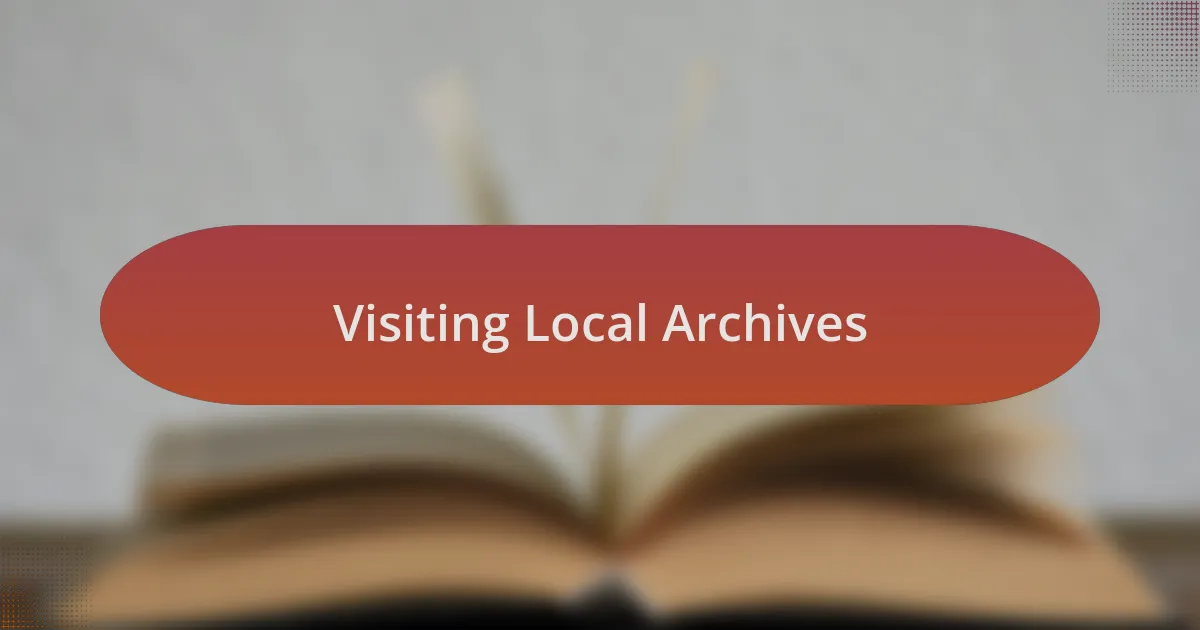
Visiting Local Archives
Visiting local archives can be a transformative experience in your genealogical journey. I still remember stepping into my town’s archive, the smell of old paper and wood mingling in the air. It struck me how much history was housed within those walls. Despite the dust, the sense of discovery filled me with excitement. Have you ever found yourself lost among the rows of historical documents, each waiting to tell its story?
Once I approached the front desk, the archivist was incredibly helpful. They guided me to specific shelves that housed marriage licenses from decades past. As I turned the pages of yellowing records, a wave of nostalgia washed over me. The feeling of holding a piece of my family history was awe-inspiring. Isn’t it curious how a simple piece of paper can evoke such strong emotions, connecting us to generations we never knew?
I learned that many local archives offer resources beyond just marriage licenses. I encountered fascinating family histories and even photographs that painted a vivid picture of my grandparents’ lives. If you get the chance to visit your local archive, take it. The discoveries I made were profound, enriching my understanding of where I came from. What stories might you uncover waiting patiently in archived records?
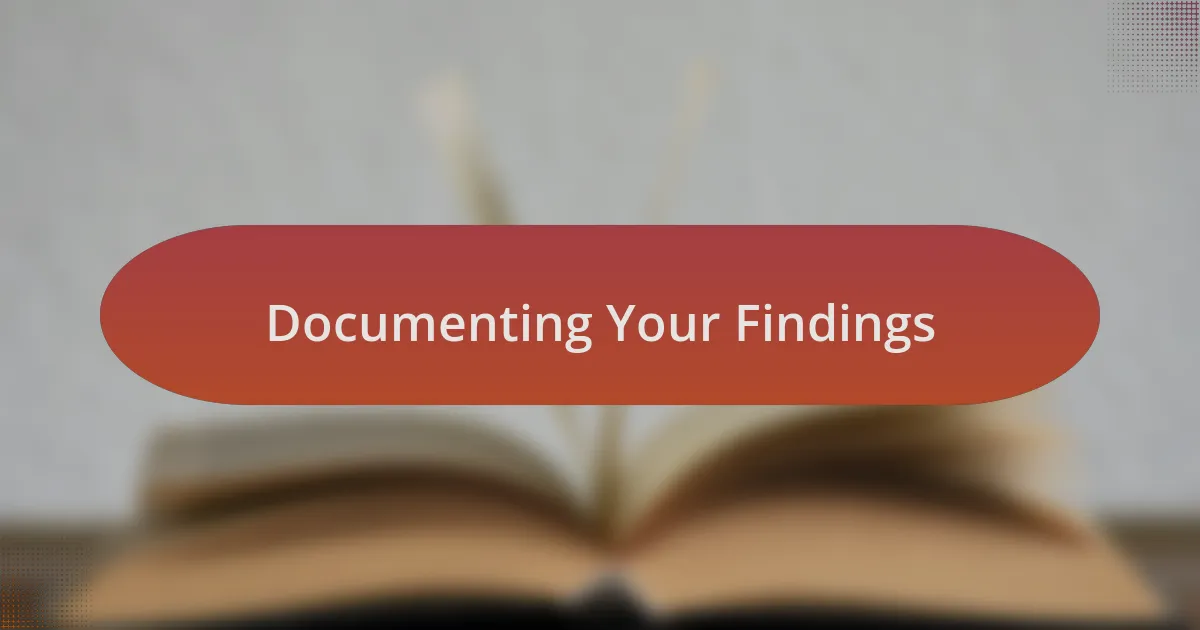
Documenting Your Findings
Documenting your findings is a crucial step in any genealogical journey. When I came across my grandparents’ marriage license, I made sure to take detailed notes, not just of the information on the document, but also of the emotions I felt at that moment. Have you ever felt a rush of connection to your ancestors? That powerful feeling is something I wanted to capture in my records.
I found that organizing my discoveries in a way that made sense to me was essential. I created a digital folder where I scanned important documents and wrote down my thoughts alongside them. This made it easier for me to refer back to my findings and reflect on their significance. Think about your own findings—how can you structure them to help you revisit those memories with clarity and purpose?
Incorporating photographs of the documents and places tied to my family helped me visualize their stories. The blend of hard facts and personal insights created a rich tapestry of my heritage. It felt like I was weaving together a narrative that celebrates my family’s journey. How do you plan to document yours?